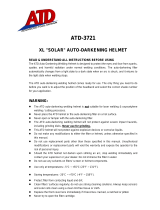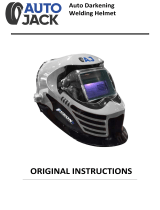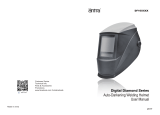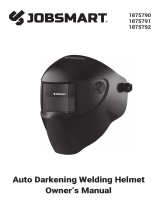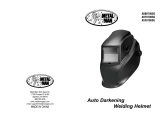
1
Professional
Quality
Welding Helmet
SAFETY WARNINGS - READ BEFORE USING
WARNING
Read & Understand All Instructions Before Using
Auto-Darkening welding helmets are designed to protect the eye and face from sparks, spatter
and harmful radiation under normal welding conditions. Auto-Darkening filter automatically
changes from light state to dark state when welding arc is struck, and it returns to the light
state when welding stops.
The Auto-Darkening welding helmet comes assembled. But before it can be used, it
must be adjusted to fit the user properly. Check battery surfaces and contacts and
clean it if necessary. Verify if the battery is in good condition and installed
properly. Set up for delay time, sensitivity and shade number for your application.
The helmet should be stored in dry, cool and dark area and remember to remove
the battery before long-time storage.
WARNING
• This Auto-Darkening welding helmet is not suitable for laser welding.
• Never place this helmet and Auto-Darkening filter on a hot surface.
• Never open or tamper with the Auto-Darkening filter.
• This Auto-Darkening welding helmet will not protect against severe impact hazards.
• This helmet will not protect against explosive devices or corrosive liquids.
• Do not make any modifications to either the filter or helmet, unless specified in this manual.
• Do not use replacement parts other than those specified in this manual. Unauthorized
modifications and replacement parts will void the warranty and expose the operator to the risk
of personal injury.
• Should this helmet not darken upon striking an arc, stop welding immediately and contact
your supervisor or your dealer.
• Do not immerse the filter in water.
• Do not use any solvents on the filter screen or helmet components.
• Use only at temperatures: - 5 °C ~ +55 °C (23 °F ~ 131 °F).
• Storing temperature: -20 °C ~ +70 °C (- 4 °F ~ 158 °F). The helmet should be stored in dry
cool and dark area, when not using it for a long time.
• Protect filter from contact with liquid and dirt.
• Clean the filter surface regularly; do not use strong cleaning solutions. Always keep the
sensors and solar cells clean using a clean lint-free tissue.
• Regularly replace the cracked / scratched / pitted front cover lens.
• The materials which may come into contact with the wearer’s skin can cause allergic
reactions in some circumstances.
• The ADF shall only be used in conjunction with the inner cover lens.
• The eye-protectors against high speed particles worn over standard ophthalmic
spectacles may transmit impacts, thus creating a hazard to the wearer.
• Toughened mineral filter oculars shall only be used in conjunction with a suitable backing
ocular.
• If the symbols F or B are not common to both the ocular and the frame then it is the lower
level which shall be assigned to the complete eye-protector.












